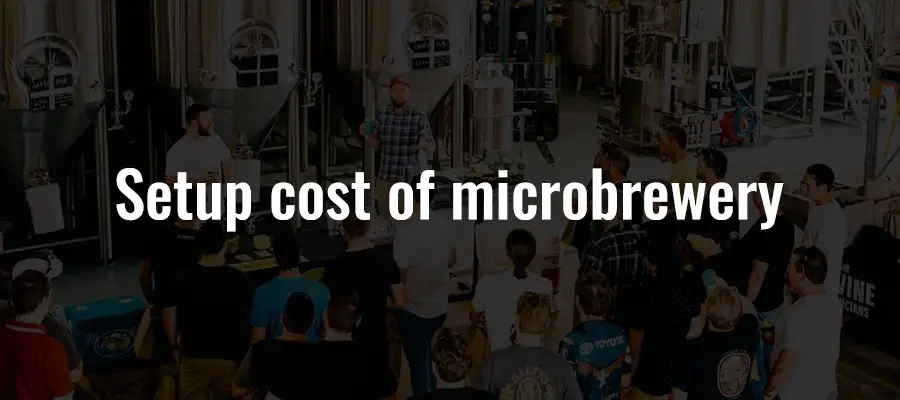The craft beer industry is booming, and according to incfile, 98% of breweries in the U.S. are independently owned craft beer businesses, and the number continues to grow at a rate of 5% per year. As the craft beer industry becomes more competitive, you need many different ways to manage your brewery start-up costs.
Brewery start-up costs
Before we get into how to manage brewery startup costs, let’s first understand what brewery startup costs are. The average start-up cost for a brewery ranges from $500,000 to $1 million, depending on the following factors:
- Brewery size
- Production level
- Location
One-time start-up costs for breweries
Compared to large-scale beer production, microbreweries and nano breweries require less budget, but start-up costs are still high. You can view the table below for an overview of one-time start-up costs for breweries:
project & cost
- Space for rent – $50,000
- Initial operating costs – $60,000
- Equipment (including filtration and labeling machines, fermenters, malt mills, hydrometers, brewhouse equipment, filling machines, refrigeration systems, cleaning tools, waste treatment systems, Beer tap hand, etc.) – $26,000-100,000
- Raw materials – $16,000
- Licenses and Permits (State-issued Business License, Brewer’s Notice from the Alcohol and Tobacco Tax and Trade Bureau (TTB), State-issued Liquor License, Operating Agreement, Retailer License) – $100-13,800
Insurance and attorney fees – $7500 - Website – $300–700
- Marketing – $500–$5,000
- Signage – $1000
- Total – $161,400 – $254,000
Long-term start-up costs for breweries
Long-term costs for a brewery include:
Labor – The average cost for a non-union brewer is about $12 per hour
Raw materials and ingredients:
- Malt – 40 to 50 cents per pound
- Hops – $4 to $5 per pound
- Yeast – 13 cents per 6-pack
- Packaging – 20 cents per bottle
- Utilities – Depending on your location and the size of your brewery, water bills can range from $125 to $150 per month, while electricity can range from $350 to $400
Equipment Repair and Maintenance – The condition of your equipment will affect the overall maintenance cost. It would be a good idea to set aside a few hundred dollars a month for a rainy day.
Brewery Indirect Costs
Indirect costs are not directly related to the production of beer. Hence, overhead is also known as an indirect cost, fixed cost, or manufacturing burden. In a sense, indirect costs such as lease fees are burdened by the cost of beer production. Overhead costs include anything that is required to produce beer. To be able to illustrate this in more detail, let’s list the costs that are usually included in the overhead:
- Wages and benefits for winemakers, cellars, and packers. This would include direct supervisors as well.
- Depreciation expense for brewery equipment and assets.
- The brewery’s rent or lease fees and any off-site storage of raw material or product inventory.
- Building maintenance and pest control costs
- property tax
- Utility bills such as electricity, gas, and water/sewers
- Chemicals and Supplies
- Uniform and Safety Equipment Fees
- Equipment rental, repair, and maintenance costs
- Insurance costs for breweries and equipment
- License fees associated with production or equipment
How to manage your brewery start-up costs?
As a brewery owner, one of the first things you need to do to save money is to look at used brewery equipment. Brewery equipment can cost upwards of $100,000, which means a few dollars saved anywhere can come in handy. Remember, when you’re on a very tight budget, every penny counts.
You need to buy a lot of equipment, from bottling lines to cooling systems, fermentation tanks, brewhouse equipment, etc. The list of raw materials needed to open a new brewery is never-ending. Spend wisely and find cost-effective ways to shop for essentials. If you’re looking for affordable brewery equipment, you can contact Micet Craft and we’ll let you get the best brewing equipment for you for the least amount of money.
Conduct research on required permits and licenses
The next way to manage the start-up costs of a brewery is to do research on the permits and licenses required. Only if you do your homework in advance can you be sure that you won’t run into any unexpected fines or expensive tickets. A lawyer or a professional in your local city is a great option to make sure you cover all the bases, and you can get some relevant tips from them. This handy tip helps you not overpay or get expensive licenses you don’t really need.
Remove any unwanted fees
The next way to manage your brewery start-up costs is to not use all the cool and wacky “stuff” until the profitability of your craft beer business is making waves. What do we mean by “thing”? It includes all the fun decor, fancy entrances, expensive menu designs, and more. All of these elements will only drain all of your brewery’s budget, all the time while you’re starting to thrive and make a profit.
Of course, you might be tempted to get a really cool piece of art to make your restaurant pop or a high-tech oven that your new chef will love. But remember, these things take time. Give your new brewery business a chance and don’t drain your budget prematurely on something unhelpful. For a brewery, a lack of cash flow means a lack of growth opportunities, and further and further away from success.
Recruit highly skilled employees
Finally, managing the brewery’s start-up costs will set the tone for the brewery’s other financial journey. Remember, brewing beer is a 24/7 process that requires great care and close attention. This means that you must always hire well-trained, highly skilled employees, and you must set aside funds for their salaries. Although you are the owner of the brewery, you cannot do everything yourself. You absolutely need funding to build a smart team of beer experts who will support the growth of your new brewery business.
How to Avoid Brewery Failure?
Unfortunately, categorizing yourself as a beer lover isn’t enough in this multi-billion dollar industry. There are many factors to consider when starting your own craft brewery business, such as logistics, details, and basics. Achieving a strong brand voice, a realistic business plan, and properly managing brewery start-up costs from the competitive craft beer industry is no easy task.
According to Chron, it is crucial to have a deep understanding of your craft, understand your market, understand your niche, and understand the distribution process. With that in mind, before starting a brewery business you need to consider why other new breweries often fail, try asking yourself these questions:
- What would you do differently to make sure your brewery doesn’t fail?
- What have you observed in other breweries you like? What is not observed?
- Do you have a clear business plan?
- Do you have enough budget to make this happen?
- How can you effectively manage brewery start-up costs to make your craft beer business successful?
The craft beer industry is changing rapidly, but there are opportunities and you need to find effective ways to operate. You need to operate differently than a failed craft brewery and manage your brewery startup costs to optimize cash flow. This will gradually become known as the king of craft beer before you know it. If you need more ideas, tips, and the best time to help you manage your brewery and impress your customers on a day-to-day basis, visit our blog. Of course, if you are planning to open a brewery, you can contact us and we will provide you with a complete turnkey solution.





